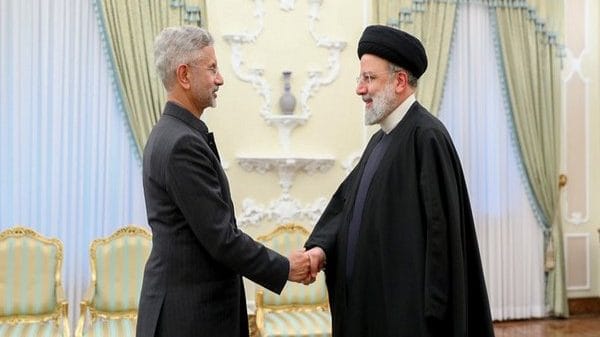After extensive negotiations, India and Iran have finally sealed a historic 10-year bilateral agreement for the operation of the strategically located Chabahar Port on the Gulf country’s eastern coast. While India initially engaged in short-term agreements with Iran starting in 2016, the newly inked deal marks a significant milestone. With its presence in Chabahar, India aims to circumvent reliance on Pakistan’s ports in Karachi and Gwadar, facilitating smoother access to landlocked Afghanistan and other Central Asian nations via Iran.
This deal has a lot of economic significance for India. Despite the nation’s preoccupation with the ongoing Lok Sabha election, the Narendra Modi government‘s decisive action, including the special permission reportedly obtained from the Election Commission of India (ECI) to dispatch a central minister to Iran, underscores the paramount importance of this deal for the nation’s strategic interests and economic future.
A milestone for India
In geopolitical dynamics, this deal is a major achievement for India and a testament to Modi’s personal diplomacy. It marks our first step into managing overseas ports and serves as a strategic move against the emerging China–Pakistan Economic Corridor (CPEC). Its timing, amid the chaos in West Asia disrupting important trade routes, makes it even more significant. Furthermore, beyond these tangible benefits, India’s diplomatic success shines through the forging of successful ties with conflicted powers. Its diplomatic success is evident in its ability to foster friendly relations with Israel while extending support to Palestine. Simultaneously, New Delhi adeptly navigates deepening ties with the United States and successfully negotiates with Iran, showcasing its diplomatic prowess. Meanwhile, our longstanding partnerships with countries such as Saudi Arabia, Russia, and Japan continue to flourish.
India’s leadership roles in the G20 forum and the Shanghai Cooperation Organisation (SCO highlight that its diplomacy is actually working. These platforms not only allow us to highlight our progress but also assert our presence on the world stage. What is noticeable is that while the G20 provides a global platform, the SCO involves non-Western nations, some of which have strained relations with the US such as China, Russia, and Iran. This adept handling of relationships with diverse and sometimes competing powers showcases a remarkable milestone in our diplomatic journey.
Also read: Modi’s speech rightly questions politics of appeasement. Wrongly targets all Muslims
Why India’s approach is better
Delhi‘s diplomatic policy is distinctly people-centric, guided by the demands and aspirations of society while prioritising the nation’s interests and maintaining a commitment to peace. It’s understandable that every country considers its own interests and those of its people in bilateral and multilateral relationships. However, I can’t help but compare this approach with Pakistan’s, whose foundation is rooted in religion. Examining the role of religion in their diplomatic relationships is intriguing. Interestingly, Pakistan doesn’t explicitly incorporate religion into its foreign policy, yet, since the nation’s inception, it has actively pursued bilateral relations with other Muslim-majority countries. This observation comes through clearly in a statement made by Pakistan’s first Prime Minister, Liaquat Ali Khan: “Pakistan came into being as a result of the urge felt by the Muslims of the sub-continent to secure a territory, however limited, where Islamic ideology and the way of life could be practised and demonstrated to the world. A cardinal feature of this ideology is to make Muslim brotherhood a living reality. It is, therefore, part of the mission that Pakistan has set before itself to do everything in its power to promote closer fellowship and cooperation between Muslim countries.”
India’s choice to develop a deep sea port in Iran due to the ongoing saga of cross-border terrorism and hostile relationship with Pakistan would be mutually beneficial. It reflects Delhi‘s ability to forge stronger ties with Muslim-majority nations in the Middle East and with Shia-majority Iran. Conversely, Pakistan, despite emphasising its religious identity and leveraging it in geopolitics, struggles to maintain positive relationships with Iran. In 2015, it found itself in a pickle with the United Arab Emirates (UAE), whose then-foreign minister Anwar Gargash warned that Pakistan would “pay a heavy price” for taking an ambiguous stand in its support for the Gulf countries. Additionally, Pakistan’s inclusion of religion in its foreign diplomacy has put its relations with France in jeopardy, particularly due to its stance on blasphemy.
This highlights not only the pitfalls of intertwining religion with foreign affairs but also its impracticality. Despite projecting its Islamic identity and aspirations to lead the Muslim world, Pakistan has found itself forging strong ties with China, a nation known for destroying mosques and carrying out human rights violations against Uyghur Muslims.
Helpful for Shias in India
For both Indians and the world, there’s a straightforward lesson to glean from Delhi‘s approach: Managing internal affairs based on pluralistic values to serve citizen interests and extending these principles to foreign policies is the way forward. While religious and caste identities hold significance, they should not supersede national identity. Indian Muslims, for instance, enjoy better opportunities than Pakistani Muslims primarily because of their Indian nationality. So it’s crucial to prioritise national interests above all else.
India already maintains cordial relations with the Middle East, which serves the interests of all Indian Muslims. Increasing the hajj quota and strengthening bilateral ties with Iran could be particularly beneficial for Shia Muslims. Iran holds significant influence over Shia Muslims, including those in India. In Lucknow, Shia clerics closely follow the rules and regulations of Shiism in Iran; an NGO aiming to foster Shia-Sunni relations even sought approval from prominent clerics in Iran before organising a joint prayer for Eid, highlighting the extent of Iranian influence. Many Shia leaders also travel to Iran and Iraq for pilgrimages and conferences. While improving relations with Iran may offer advantages for Indian Shia Muslims, it’s important to guard against undue foreign influence as well.
Amana Begam Ansari is a columnist and TV news panelist. She runs a weekly YouTube show called ‘India This Week by Amana and Khalid’. She tweets @Amana_Ansari. Views are personal.
(Edited by Humra Laeeq)







Informative and impressive